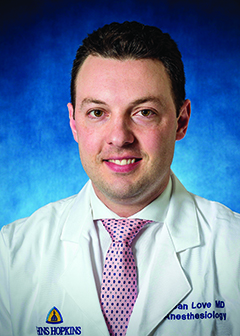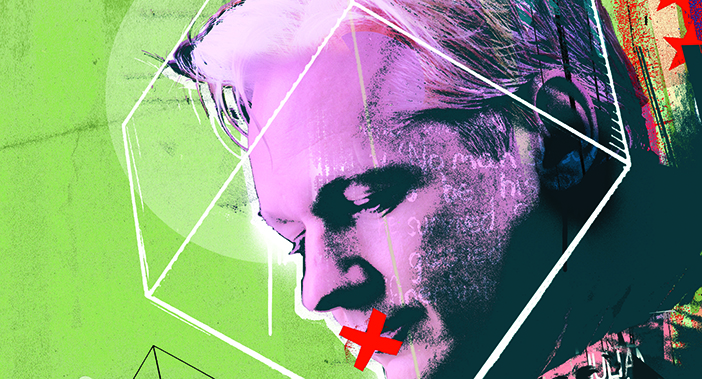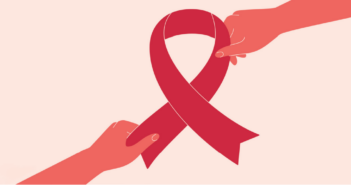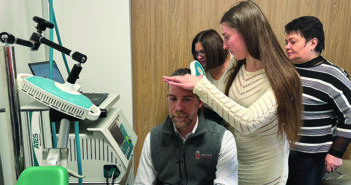Hero or villain? No matter their opinion of Julian Assange, all doctors should agree he deserves medical care, argues Sean Love MD’17. In a wide-ranging interview, the human rights advocate talks about health care for asylum seekers, challenging biases, and his meeting with the controversial founder of WikiLeaks.
In May 2018, a week before graduating from the Warren Alpert Medical School, Sean Love MD’17 met with WikiLeaks founder Julian Assange in the Embassy of Ecuador in London to propose that he undergo a series of objective forensic medical and psychological evaluations.
Two years and dozens of hours of evaluations later, the UN Special Rapporteur on Torture was so moved by the teams’ findings that he proclaimed, “Mr. Assange has been deliberately exposed, for a period of several years, to progressively severe forms of cruel, inhuman or degrading treatment or punishment, the cumulative effects of which can only be described as psychological torture.”

Now, one of the senior evaluators on the team, whom Love recruited to the project, has been asked to testify in Assange’s case against extradition to the US, where he faces charges under the 1917 Espionage Act—carrying the maximum penalty of life in prison—for his work publishing classified information related to the US wars in Iraq and Afghanistan. Meanwhile, Love, a combined anesthesiology resident and adult critical care medicine fellow at Johns Hopkins, continues to advocate for Assange’s health. Through his work, Love seeks to remind us and the international community that, regardless of our personal or political opinions, everyone is entitled to their fundamental human rights, including the rights to privacy and access to health care, under international law.
Medicine@Brown asked Love to share how and why he became involved in Assange’s case, and how his experiences at Brown affected his development as an advocate for human rights.
How did you become interested in this subject?
As an undergraduate at the University of North Carolina, I studied political science and international affairs. The wars in Iraq and Afghanistan dominated discussions at the time. I also worked for a veterans’ advocacy group in Washington, DC, that helped bring public attention to the signature injuries of the wars: traumatic brain injury, post-traumatic stress disorder, and soldier suicide. We lobbied Congress to improve care and reduce extended deployments. Through the experience, I learned about the conduct and consequences of war, and I began to contemplate a career caring and advocating for those wounded by conflict.
Like most other Americans, I first heard about Julian Assange and his alleged source, Chelsea Manning, in 2010, when WikiLeaks released the Iraq and Afghan War Logs. I followed the debates that ensued, such as those over US war crimes, whistleblowing, and freedom of the press.
Later, in my first year of medical school, I helped establish the Brown Human Rights Asylum Clinic, a student-run, faculty mentored clinic that provides forensic medical evaluations of survivors of torture seeking asylum in the US. We worked with the NGO Physicians for Human Rights to build local capacity. Together we hosted trainings and various seminars to teach medical students and faculty from around New England how to conduct physical and psychological evaluations of asylum seekers following the Istanbul Protocol, a set of guidelines for documentation of torture and its consequences developed by the UN. It was the nexus of these experiences that led me to organize the evaluations of Julian Assange at the Ecuadorean embassy.
There are millions of asylees in the world and no shortage of human rights causes worth defending. Why Assange?
There are indeed many asylees and there are even more refugees. With the European refugee crisis and ongoing immigration issues at the US southern border, the public is increasingly aware of issues pertaining to asylum. Originally I thought I would write about Assange’s experience as an asylee as a way to bring attention to the field of asylee health in general. This, however, proved unfeasible as I learned quickly how unique Assange’s situation was, as well as how highly politicized he had become in the wake of the 2016 US presidential election. I encountered a number of people early on, including medical professionals and academics, who felt strongly that Assange was not deserving of his status as an asylee. After some reflection, I found that my goal in taking on the project was this: to remind the medical community that human rights apply equally to everyone, most especially those we may disagree with politically. Those persecuted on account of race, religion, nationality, political opinion, or belonging to a particular social group are most vulnerable. We have to remember, the whole purpose of the international human rights system is to defend such people, and I wanted to call attention to this.
Take us through Assange’s legal situation to date.
Assange was a political asylee of the state of Ecuador from 2012 to the time of his arrest in April 2019. From 2010 to 2012, Assange was living in the UK under house arrest, fighting an extradition case to Sweden, where he faced questioning over sexual abuse allegations. When the UK courts ordered Assange to be extradited to Sweden in the summer of 2012, he sought refuge in the Ecuadorean embassy. Assange subsequently applied for political asylum in Ecuador on the grounds that, if extradited to Sweden, he would be onward-extradited to the US, where he would face persecution and undue punishment on account of his publishing activities. After extensive review of the rationale and justification for his application, Ecuador granted Assange asylum under international law. However, UK authorities refused safe passage for Assange to Ecuador, stating that they would arrest him (under any circumstances) as soon as he left the embassy. This led to a stalemate under international law: Ecuador declared Assange an asylee persecuted on account of his political beliefs and publication activities, while the UK declared him a fugitive. Seeking to rectify the legal situation, in 2015, the UN intervened and undertook an extensive review of his case. After hearing arguments from both sides, the UN ruled that his situation within the embassy amounted to an “arbitrary detention” and called on the UK to grant Assange safe passage to Ecuador, where he could enjoy the full rights of his asylum. The UK refused. Subsequently, Ecuador applied for Assange to be granted humanitarian safe passage to a hospital, where he could be diagnosed and treated for several ailments. This was also refused by UK authorities.
What is Assange’s situation now?
Assange is in Belmarsh Prison in southeast London, having been forcibly removed from the embassy by British police after Ecuadorean officials renounced his asylum and citizenship in April.
In 2001 and 2002, Belmarsh was used to detain a number of people indefinitely without charge, leading the international press to draw comparisons between it and the detention camp at Guantanamo Bay. Today, the prison holds domestic and foreign nationals charged with terrorism-related offenses, murder, and other crimes. On May 1, the UK courts sentenced Assange to 50 weeks for skipping bail when he sought asylum in the Ecuadorean embassy. That same day, the US government unsealed an indictment against Assange related to the leaks provided by Chelsea Manning. On May 23, the US further charged Assange with violating the Espionage Act, reminiscent of the Pentagon Papers case from the Vietnam War era. This is the first time a publisher (and not a source) has been charged for releasing classified information. Barring diplomatic intervention, Assange will likely serve a 50-week term in Belmarsh. In June, Sweden rescinded its extradition request, indicating that they will send their prosecutors to London to question him there, something Assange’s lawyers have argued for since his house arrest in 2010. Lastly, his hearing for extradition to the US is scheduled for February 2020.
With whom did you work on this project?
Members of Brown’s faculty, including Dr. Josiah Rich, helped connect me with experts willing to take on a case of this magnitude. Eventually I recruited two people: Dr. Brock Chisholm, a British psychologist and expert in PTSD who has served in several high-profile cases in UK and international courts, including a case litigating against torture at CIA-run “black sites”; and Dr. Sondra Crosby, an internal medicine physician and associate professor of health law, ethics, and human rights at the Boston University School of Public Health. Crosby served as director of the Boston Center for Refugee Health and Human Rights, where she examined over 300 torture victims, and was one of the first doctors allowed to independently examine Guantanamo Bay detainees. Starting in the fall of 2017, Drs. Chisholm and Crosby began conducting independent evaluations of Assange at the Ecuadorean embassy. Working in parallel, they painstakingly examined and documented Assange’s condition, clinical status, treatment, and physical and mental deterioration under extremely challenging and, as we have argued, inhumane circumstances.
What were your impressions of Assange’s situation on meeting him for the first time? What was the embassy like?
I first met with Assange in a small conference room within the Ecuadorean embassy on May 19, 2017, about an hour after he last appeared in public from the balcony of the embassy, where he had addressed a large crowd of reporters on the street outside. During our conversation, white noise emanated from a stereo to interfere with listening devices, Assange explained. The embassy was a tense and uneasy space, located on the first floor of an old apartment building, where it had been converted to a couple of small, cramped offices. Its windows looked out onto a two-lane street, but for security reasons, heavy curtains were drawn at all times. During the day, consular activities took place there. In the back, Assange had a small room with a cot and shared a bathroom with embassy staff. He had no meaningful access to the outdoors, and had to rely on others for food and clothes. I found it almost inconceivable that he had been living there, surviving, for almost five years.
What did the evaluations find?
Much of this information is protected by doctor-patient confidentiality. What I can say is that Assange is resilient, but his suffering and the psychological toll of his circumstances were apparent. Compounding these injuries was that, for nearly seven years, Assange had been unable to receive proper medical care. Within the embassy, he had difficulty obtaining treatment, as most physicians refused to visit him for fear of associating themselves or their medical practice with him, his political views, or his publishing activities. Meanwhile, UK authorities predicated his access to a hospital on his arrest. If he suffered a medical emergency, such as a stroke or heart attack, would he stay in the embassy and risk going without treatment for a potentially life-threatening issue? Or would he be forced to relinquish his asylum by seeking care in a hospital? To a person who was granted asylum in part due to threats against his life from various governments, this presented an impossible situation. Yet this was one of the questions Assange and his staff had to grapple with throughout his nearly seven years in the embassy. Adding to this, several new restrictions were implemented starting in March 2018 when, at the direction of a newly elected president, Ecuador severed Assange’s internet access and severely restricted his rights to receive visitors at the embassy. From then until his arrest in April, Assange was living in circumstances similar to solitary confinement.
Describe your efforts to defend Assange’s human rights.
As clinicians, it is our ethical duty to advocate for the health and human rights of all people as promised under international law, and to call on our colleagues to hold our professional societies, institutions, and governments accountable. Based on Crosby and Chisholm’s findings, we felt compelled to advocate for Assange’s health—and to draw a clear distinction between advocacy for his health and political support for him or his work. We published an editorial in The Guardian in January 2018 calling attention to the health effects of his detention. In June 2018, I published a follow-up piece in the British Medical Journal, in which I called on the international community, and in particular the Australian government, to defend his right to access health care. In February, Crosby conducted her final evaluation of Assange in the embassy. She then wrote to the Office of the High Commissioner for Human Rights at the UN. Based on her observations, the UN appointed its Special Rapporteur on Torture, Nils Melzer, to look further into Assange’s condition. In May, Melzer led a UN delegation and took independent medical evaluators with him to visit Assange in Belmarsh. Based on this meeting, Melzer validated Crosby’s findings, calling Assange’s treatment at the hands of the UK over the past seven years “torture.” Crosby will visit Assange at Belmarsh later this year to continue the evaluations, and she will testify in his extradition hearing in February. In the meantime, I remain involved in his case through communicating with human rights organizations and amplifying issues pertinent to his health on Twitter (@SeanLoveMD) and in the news media. In April, I discussed Assange’s health in a 20-minute TV interview on Telesur.
Where do you see things going from here?
Assange’s situation is too fluid and complex to predict. In 2012, when Assange was asked how long he thought he would have to stay in the embassy, he replied “perhaps a few months.” What I do know is I will continue to defend Assange’s rights under international law, including his right to access health care. Last spring Assange was in the medical ward at Belmarsh, receiving treatment for ailments that were either caused or severely exacerbated by his detention within the embassy. I remain concerned that if Assange is extradited to the US, he may face treatment similar to that of Chelsea Manning, who for years was, according to the UN, subject to “cruel and inhumane treatment” while being held in solitary confinement.
What difficulties or obstacles have you encountered in the course of this work?
Defending the human rights of a controversial figure has been challenging. For a time, Assange was considered a “hero” by some following the disclosures of the Iraq and Afghan War Logs. This changed in 2016, when WikiLeaks released the Podesta/DNC emails; some liberals came to view him as a villain while some conservatives, including President Trump, praised him. Meanwhile, Sweden continues to investigate allegations of sexual misconduct dating from 2010. The evolving public opinions of Assange have created an exceedingly difficult, if not at times toxic environment within which to defend his human rights. Our team has been approached by hecklers, harassed on social media, and at times viewed with suspicion by colleagues in academia.
More importantly, organizations such as Human Rights Watch, Amnesty International, and Physicians for Human Rights, which are typically at the vanguard of calling attention to human rights violations and mistreatment of persons because of their political beliefs, have been at times hesitant and even reluctant to speak out. This is true even in the context of the UN Working Group on Arbitrary Detention having called for Assange’s release as well as recent statements by UN Special Rapporteur on Torture Nils Melzer. I believe, among other things, this has much to do with the personal and political biases of individuals working in the human rights field. As professionals, we aspire to be objective and impartial in our analyses. Yet we are only human. As Melzer admitted publicly, he was initially reluctant to take on Assange’s case due to his being “prejudiced” by the prevailing political climate and what he had been reading in the news media. To understand the human rights aspects of Assange’s case, we must look beyond what a politically polarized media would have us believe. Instead we have to examine critically the circumstances of the situation with respect to what individuals are entitled to under international law: namely, to be free of cruel, inhuman, and degrading treatment and torture. When asked about my own biases, I echo the words of Dr. Crosby in sworn testimony, “Yes, I am biased against torture. And you should be, too.”
What advice do you have for Warren Alpert medical students based on your experience?
I think it is paramount to recognize the unique perspective that a medical education, especially one from Brown, lends to working on issues pertinent to social justice and human rights. Of course, we also have to be willing to leverage this perspective to take action, and to do so often requires courage. There are some who will say that defending human rights against political headwinds can negatively impact one’s career. However, to accept this is to undermine one of the crucial roles that physicians play in society: advocating for their patients, no matter how unpopular, repressed, or persecuted they may be. I might have been among the first people to call attention to this particular issue, but I found quickly that courage is contagious




